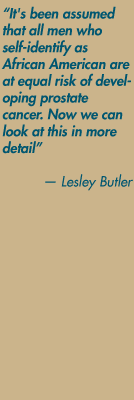A new study under way at UC Davis Cancer Center may give doctors a valuable new tool for making decisions about prostate-cancer screening and treatment for African-American men.
The "Diet and Ancestry Study of Prostate Cancer among African Americans" will analyze blood samples from African-American volunteers living in the Sacramento area for genetic markers of European and African ancestry. The study is seeking 50 men with prostate cancer and 50 who do not have the disease.
As a group, African- American men are twice as likely as white men to develop prostate cancer, and twice as likely to die of the disease. But UC Davis Cancer Center researchers expect to find that not all black men have the same prostate cancer risk. The researchers hypothesize that African Americans of predominantly European ancestry will have a lower prostate-cancer risk than those of predominantly African ancestry.
"It's been assumed that all men who self-identify as African American are at equal risk of developing prostate cancer. Now we can look at this in more detail," said Lesley Butler, an assistant professor of public health sciences and the study's principal investigator.
The researchers will look for genetic markers called Ancestry Informative Markers, which can be used to estimate the African and European contributions to the genetic makeup of an individual. The genetic analysis will be overseen by Michael Seldin, professor and chair of the Rowe Program in Genetics.
The National Cancer Institute, in its recent report, "Accelerating Successes Against Cancer," emphasizes the importance of research to more precisely identify populations with genetic predispositions to particular malignancies, as a first step toward designing screening, chemopreventive and other strategies to reduce these risks and save lives.

